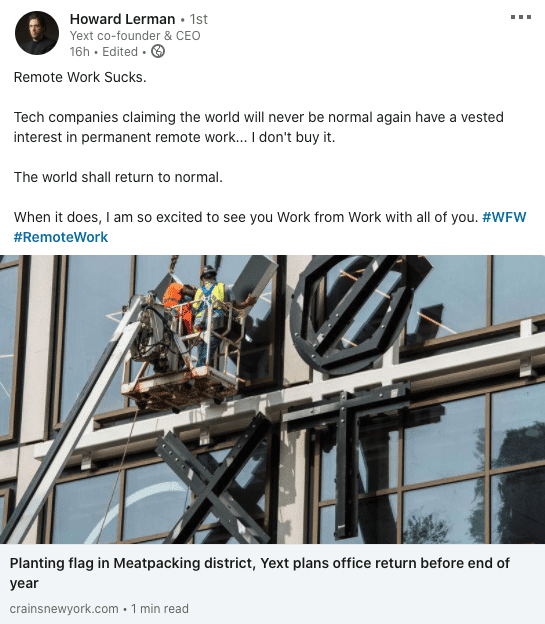After many months of working from home, at least among the knowledge workers dominating the local commerce and SaaS worlds we cover, leadership has largely fallen into two camps.
One the one hand, there are those who have embraced WFH. Few organizations have committed to a 100% remote post-pandemic work model. But at the very least, the pro-WFH camp sees benefits to remote work and will expand it post-pandemic.
One example is Apple CEO Tim Cook, who recently said he doesn’t expect to “return to the way we were because we’ve found that there are some things that actually work really well virtually.”
Thryv, which has announced plans to go public, says it will shift to a “remote first” workplace model. The company has maintained a large Dallas headquarters (formerly the offices of Brannif airlines). But many members of its senior ranks have worked remotely for years.
And as we previously reported, Matchcraft CEO Sandy Lohr told us her company, which was a remote-office hybrid before the pandemic, will further shift in the direction of remote work.
“You know, we used to say, ‘Think digital-first’. Now we think remote first. And that’s just the new mantra. Now our mode of operation has to be thinking virtual. I think that is the new norm,” Sandy told Localogy.
“I Don’t See Any Positives”
And then there is the “remote work sucks” contingent. These leaders believe that a cohesive, collaborative, and creative workplace culture suffers immeasurably in a remote environment. Netflix CEO Reed Hastings is solidly in this camp. He recently and now famously said, “I don’t see any positives” when asked his views of remote work.
Yext CEO Howard Lerman planted his flag in the “RWS” camp with a LinkedIn post on Thursday. The post shares an article reporting on Yext’s plans to begin returning to the office this year.
‘Energized’ by Interactions
We caught up with Howard over email last night and asked him to expand on his views of WFH. As expected, his opinions are more nuanced than “remote work sucks” does justice. But he’s definitely not a huge fan.
“Look, I think it’s fine for certain situations. I don’t expect everyone to be back in the office. But I personally, and a lot of people I know, get energized from being around others. You can’t replicate the random and casual interactions you get over zoom. I’m just more creative when I’m around certain other people,” Howard told Localogy.
He voiced particular skepticism about the ability to integrate new employees into a cohesive team in a remote setting. And he casts doubt on the motives of some remote work advocates.
“I also think it’s a bit more nuanced than good or bad. If you’ve been at your company for a long time, and you’ve been working together for awhile it’s a lot easier. I don’t envy a new employee joining a company for the first time, virtually. A lot of companies are probably coasting on the capital they’ve built up over the years from working together. That will work fine for a while, but it won’t last forever,” he said.
“The world’s going to return to normal. A number of the technology companies claiming that it won’t have a vested interest in everyone working remotely.”
Stay tuned for more content from Localogy on the work-from-home phenomenon.
More from Localogy
Yext, Thryv and Fluency Honored with Inaugural Localogy Leaders Award
Local Industry Weighs in on the Pros and Cons of Remote Work





